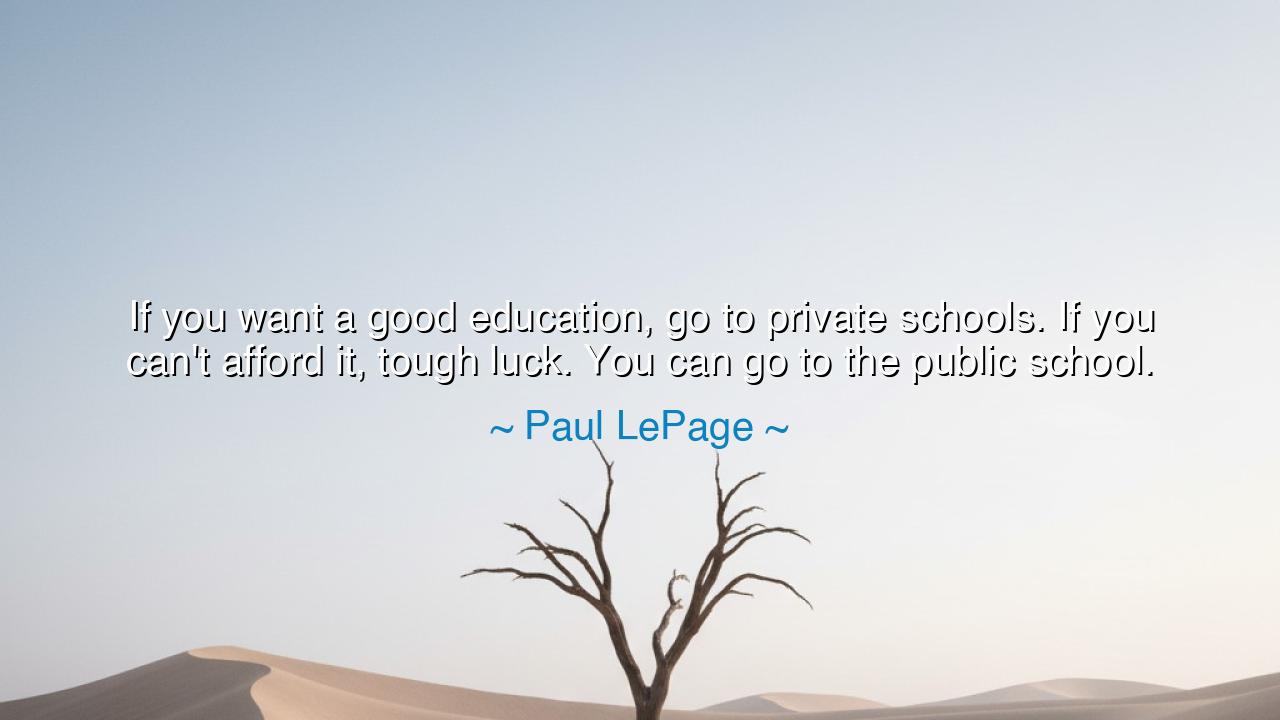
If you want a good education, go to private schools. If you can't
If you want a good education, go to private schools. If you can't afford it, tough luck. You can go to the public school.






The words of Paul LePage—"If you want a good education, go to private schools. If you can’t afford it, tough luck. You can go to the public school."—echo not merely as a statement of policy, but as a mirror held to the face of society. They reveal a harsh truth that has lingered through centuries: that education, though the noblest of all pursuits, is too often treated as a privilege rather than a birthright. LePage’s tone, blunt and unapologetic, forces us to confront an uncomfortable reality—that the gate to knowledge is not always open to all, but sometimes barred by the iron lock of wealth.
In the style of the ancients, one might say: these words are a lamentation disguised as truth. For if the child of the poor must accept ignorance as fate, and the child of the rich inherits wisdom by coin, then justice itself has grown blind not by cloth, but by gold. True civilization is not measured by its palaces or armies, but by how it educates its weakest. A people that allows its poor to remain unlearned is like a gardener who waters only one side of his field—the other withers, and soon, so does the whole.
History offers many examples of those who rose from humble origins, defying the curse of inequality in education. Abraham Lincoln, born in a log cabin, taught himself to read by firelight, using borrowed books and the faint glow of his own determination. He had no private tutor, no grand library, no benefactor—only the fierce hunger of the mind. Yet, through this self-made education, he grew into one of the greatest leaders of men. His life cries out to every age: that wisdom cannot be bought, it must be earned—and that a society must open doors, not close them, for its future Lincolns.
But LePage’s quote also serves as a warning—a reflection of a growing divide. When the powerful speak as though learning were a luxury, they declare a silent war against the spirit of progress. For it is not wealth that secures a nation’s strength, but the education of its people. Empires have fallen not for lack of riches, but for lack of knowledge. The scholars of Baghdad once illuminated the world with wisdom, yet when learning was silenced, their golden age ended. The lesson is eternal: inequality in education is the beginning of decline.
There is, too, a deeper wisdom hidden beneath the hardness of LePage’s words. Perhaps he meant to provoke, to awaken those who hear—to make them feel the injustice so keenly that they rise to correct it. For sometimes truth must come not as a gentle whisper, but as a blow to the conscience. His words remind us that if the world denies you education, you must seek it by your own strength, as Lincoln did, as Douglass did, as countless others have done when society turned its back.
And yet, it is not enough for the individual to persevere; the collective must act. Let no child grow believing that poverty condemns them to ignorance. Let every teacher, every citizen, every leader remember: education is the foundation of freedom. To neglect it is to invite darkness; to nurture it is to kindle light. The wealth of a nation is not in its banks, but in the brilliance of its minds and the compassion of its hearts.
So, to those who hear these words, take this lesson: if the world denies you opportunity, build your own. If the gate of education is closed, find the key within your determination. Read when others sleep, question when others conform, and grow when others surrender. But never accept that learning belongs to the few. For the true education—the education that uplifts the spirit and transforms humanity—is not sold in schools, but found in the will to know, the courage to rise, and the faith that every mind, rich or poor, has a light worth kindling.






AAdministratorAdministrator
Welcome, honored guests. Please leave a comment, we will respond soon